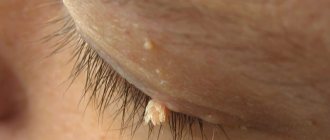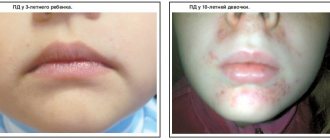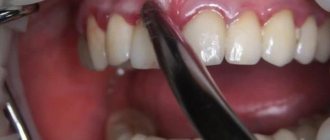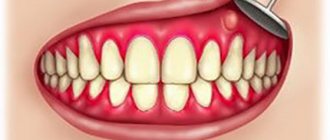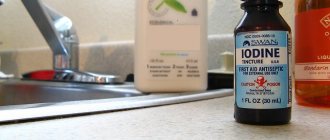Bad breath as a symptom of illness
Since the time of Hippocrates, a doctor, when examining a patient, paid attention to the smell of the mouth and could make a diagnosis based only on this sign. Indeed, in this place of the person the mucous membrane is very thin and the blood vessels pass close to the surface. Metallic breath occurs due to diseases of the gums, teeth and oral mucosa. In addition, the esophagus and respiratory tract exit into the mouth. By the smell of your mouth you can judge the condition of the stomach, liver and lungs, not to mention systemic diseases - anemia, thyroid tumors, stomach and duodenal ulcers, cholecystitis.
It happens that a metallic odor from the mouth of an adult is a one-time phenomenon, which arose, for example, under the influence of a medication or a new denture in the mouth. In this case there is nothing to worry about. If the metallic smell in the mouth has become constant, this means that it is necessary to undergo a full examination by a doctor.
Urgent symptom relief
Any disease that causes sour, rotten breath or the aroma of rotten eggs must be treated. Such diseases cannot be cured overnight; sometimes long-term therapy and special medications are required. But there are situations in life when you need to get rid of the stench urgently, for example, before a date or a business meeting. If your breath stinks, you can:
- Chew menthol gum.
- Brush your teeth thoroughly with mint paste and mouthwash.
- Chew grains of coffee for a few minutes.
- Rinse your mouth with antibacterial drugs (Chlorhexidine).
All of these methods can only temporarily remove rotten odor from the mouth; the causes of halitosis remain, and after a few hours it returns again. A more effective way to get rid of the smell of rot or rotten eggs in the mouth is to rinse your mouth with disinfectant solutions regularly. To do this, use special pharmaceutical preparations, chamomile decoction. This procedure will not get rid of halitosis immediately, but the effect will be more sustainable.
The causes of bad breath in adults and treatment options for this symptom are incredibly varied. Halitosis can occur in both healthy and sick people, so diagnosis is always necessary. Especially if the aroma is very sharp, purulent, contains impurities of acetone and ammonia, when a bitter taste is added.
If your breath stinks in the morning, it means that a person does not take enough care of his oral cavity. To get rid of the manifestations, you should brush your teeth more thoroughly and use natural and pharmacy mouthwashes more often. For ailments of the internal organs (liver, stomach, pancreas, tonsils, sinuses), you need to carry out full treatment, take prescribed medications and, if necessary, undergo surgery.
To come in
Oral diseases
If a metallic odor appears from the mouth, then the cause of it, first of all, is sought in the mouth. This symptom can be caused by various diseases of the mucous membranes, gums and teeth.
Inflammation of the gums, namely periodontitis and gingivitis, are accompanied by bleeding, which gives a metallic taste in the mouth and the smell of blood. Similar symptoms occur with stomatitis. After all, small ulcers on the mucous membrane can also bleed. Deep caries leads to pulpitis, which often causes bleeding from the tooth. However, this creates a putrid smell.
The characteristic taste of iron is caused by a phenomenon called galvonism. It occurs in people with installed dentures that have metal parts in their design. The galvanic current that occurs under the influence of saliva is manifested by dry mouth, pain in the gums and tongue, loss of the ability to recognize tastes, as well as frequent headaches. In this case, the treatment is obvious - it is necessary to replace the prosthesis.
As for other diseases, a dentist will help you cope with them.
How do worms cause halitosis?
Often, bad breath occurs with giardiasis. It is believed that bad breath due to Giardia occurs as a result of the release of toxic substances. In addition, with giardiasis, a strong coating appears on the tongue, which is also considered the cause of halitosis. But not only giardiasis is a consequence of a bad odor that is noticeable in the oral cavity. A fairly common question is, can there be bad breath due to worms?
A parasitic worm, popularly called a worm, is also a provoking factor in the occurrence of halitosis. Worms and oral odor are closely related, since helminths, settling in the gastrointestinal tract, release substances that poison the internal organs throughout their life and thereby provoke a painful picture.
But besides this, worms can move inside a person and be localized on any organ; they can also have a detrimental effect on the mucous membranes, provoking inflammation processes.
As a result, a foul odor appears from the initial part of the digestive tract of varying intensity and degree. It is worth considering that with halitosis caused by parasites, other signs of helminthic infestation must be present, and if these are absent, then the root cause of the stench lies elsewhere.
Diseases of the gastrointestinal tract
The causes of metallic breath in an adult may lie in problems with the gastrointestinal tract. This could be a peptic ulcer of the stomach or duodenum, gastritis, or even dysbacteriosis, when the intestinal microflora is disturbed. Inflammation of the gallbladder and liver pathologies can cause a malfunction of the entire digestive system.
A metallic taste in the mouth is not the only symptom; such diseases are usually accompanied by acute pain in the stomach, weakness, nausea, and bowel dysfunction. A gastroenterologist can establish an accurate diagnosis and prescribe treatment in this situation.
Iron taste in the mouth: causes
An iron taste in the mouth is not always a consequence of any disease, since this is how the body can react to external irritants. It all depends on how often such a sensation occurs, what symptoms accompany it and in what situation it occurs.
An iron taste in the mouth may appear due to the following non-pathological factors:
- mineral water enriched with iron ions. Such waters are prescribed for the treatment of iron deficiency conditions;
- poor quality tap water. In an old plumbing system whose pipes are rusty, the water is saturated with iron ions;
- metal dentures or implants. If a person who has metal dentures or implants eats acidic food or drinks an acidic drink, the iron ions will react with organic acids, which will cause an unpleasant metallic taste in the mouth. Also, a similar sensation may appear if dentures are made of different metals, which can also react with each other;
- using aluminum or cast iron cookware when cooking. Organic acids in foods react chemically with metal ions from which the cookware is made;
- presence of piercings on the tongue, lips. The metal from which the jewelry is made reacts with acidic foods or drinks, resulting in a metallic taste in the mouth;
- poor oral hygiene. Plaque on the tongue, caries and tartar can also provoke a similar sensation;
- massive body jewelry, watches and metal bracelets.
Hypovitaminosis
Disturbances in the level of microelements in the human body are called hypovitaminosis. It can also cause an unpleasant metallic odor from the mouth. This condition is accompanied by other symptoms that help diagnose it: weakness in the limbs, increased fatigue, sleep disturbances, mental disorders, problems with memory and brain speed.
Hypovitaminosis is the main cause of metallic breath in a child, since during the period of intensive growth of the body, the level of one or another element in the blood is often disturbed.
First symptoms of infection
In the human body, worms begin to actively act, so in the early stages a person feels many changes in his body. It is important to listen to the general condition and if there is a change, consult a doctor and get tested for the presence of helminths. Among the main symptoms, doctors note:
- intestinal dysfunction (constipation, diarrhea);
- general weakness, drowsiness, malaise;
- headache and dizziness;
- severe abdominal pain;
- allergic reaction (itching, rashes on the body, swelling, redness of the skin);
- rapid weight loss;
- increased body temperature (no more than 37.5°);
- the skin and mucous membranes become pale;
- bad breath.
All these signs accurately indicate the presence of worms in the body. It is necessary to urgently consult a doctor and get tested to accurately determine which parasite is in the body. Based on the data received, the doctor will prescribe the necessary medications.
We suggest you read at what temperature do bedbugs and their larvae die?
Diabetes
Diabetes mellitus is characterized by a violation of the absorption of glucose by the body's cells, which ultimately accumulates in the blood, causing the destruction of the walls of blood vessels in all internal organs and skin.
It is this manifestation of diabetes that can cause a taste of blood in the mouth. That is, the thinnest vessels of the mucous membrane of the mouth and gums burst and bleed. Symptoms of diabetes include constant thirst and long-lasting wounds. If a person experiences all of these manifestations at once, he needs to urgently undergo examination by a doctor and receive a referral for treatment. Otherwise, it may end in diabetic coma and death.
Causes not related to diseases
It happens that an absolutely healthy person develops a metallic taste in the mouth. The reason for this may be heavy metal poisoning at work, dehydration, addiction to dietary supplements or taking vitamins.
A person himself is able to identify the etiology in this case if he traces the cause-and-effect relationship of being, for example, in a paint factory workshop with the appearance of a metallic taste in the mouth. You just need to be more attentive to your body and not abuse dietary supplements.
We also must not forget that metal ions can enter the body through the skin, so an iron taste in the mouth may appear as a result of constant skin contact with iron, for example, as a result of working with it or when wearing metal jewelry such as chains and bracelets.
A metallic taste may occur as a result of eating it. It comes from old water pipes or metal utensils. To identify this reason, it is enough to let tap water sit in a glass cup for several hours and see if sediment has formed at the bottom. It’s better to avoid metal utensils altogether.
What can cause steely breath?
Metallic breath can be a symptom of serious diseases of the blood, pancreas and stomach. But doctors recommend that before consulting a doctor, pay attention to the intensity and nature of this symptom. If it appears in the first few hours after eating and goes away quickly, then the problem lies in the diet.
Taking medications with iron gives a metallic taste
All the causes of such an unpleasant sign of bad breath for a person and people in contact with him are conventionally divided into those dependent on pathologies of organs and systems, and independent of them. There is no need to worry too much about the risk to health or life, because most often, a short-term smell or taste of iron in the mouth has the following reasons:
Drinking tap water
The concentration of iron in ordinary water is often far from safe levels. This is easy to check. It is necessary to collect several liters of water in a container and let it sit for several days. If sediment is noticeable at the bottom of the vessel, then care should be taken to install home filters. Having solved this problem, all unnatural odors and tastes in the mouth will quickly go away on their own.
Poor quality and hard water
Cooking food in low-quality cookware
Most often, such problems arise among those people who use aluminum pans in the kitchen. By removing them from the household, the unpleasant symptom will also cease to bother you.
Dangerous cookware (aluminum and chipped)
Professional activity
Poor working conditions (usually for men) in heavy production are often the main cause of the taste and smell of metal.
Body metal accessories
Most of the world's population uses wristwatches every day, as well as a variety of jewelry. Metal ions can penetrate a person’s skin and spread through the blood throughout the body. The result is discomfort in the mouth and an unnatural odor.
Metal jewelry can cause
The smell of metal from the mouth of a child and an adult can also be of a physiological nature.
This is especially true for women during pregnancy. In the first trimester of pregnancy, the level of iron in the blood actively decreases. Therefore, if a girl’s breath smells like iron, this can be a reason for her joy.
Metal crowns cause iron taste
Iron odor from the mouth during pregnancy
During pregnancy, a woman’s body is completely rebuilt in preparation for pregnancy and subsequent childbirth. Internal metabolism often leads to disruption of iron levels, which consequently causes bad breath. This usually happens in the first months of pregnancy.
Lack of iron and calcium, in turn, leads to dental diseases, periodontal disease, caries, and so on. This definitely affects the cleanliness of your breath and bad breath.
That is why a pregnant woman must regularly undergo tests throughout her entire pregnancy to determine the level of essential microelements in her blood in order to prevent their deficiency.
Principles of treatment
You can get rid of bad breath only by eliminating the cause of its occurrence. If this occurs as a result of diseases of the stomach or liver, you need to undergo treatment from a gastroenterologist. If the cause of the unpleasant taste is a disease of the teeth and gums, then you need to consult a dentist. It is best to first visit a therapist; he will be able to detect the primary cause and refer you for examination to a more specialized specialist. For example, the causes of metallic breath in a child are determined by a pediatrician, and in pregnant women - by a gynecologist.
Treatment of unpleasant odor
How to get rid of odor in the mouth? You can eliminate the unpleasant “aroma” caused by the presence of helminths if you overcome the main cause of its appearance. The smell will go away immediately after the parasites are destroyed. During treatment, of course, you can use additional methods to combat this delicate problem. Experts recommend the following procedures to patients:
- brush your teeth with special antibacterial pastes;
- additionally use high-quality rinses;
- rinse the mouth with herbal decoctions.
These methods will not completely solve the problem; they will only remove the smell for a short time. It is imperative to destroy helminths in the body. Treatment directly depends on the type of worms. As a rule, doctors prescribe Pyrantel, Levamaison, Albedazole, Piperazine and other tablets. The doctor outlines the treatment regimen, as he takes into account the type of worms, as well as the individual characteristics of the patient, for example, his weight.
A quick way to get rid of the metallic taste in your mouth
It is clear that the unpleasant taste in the mouth will go away after appropriate treatment, but nothing prevents a person from taking steps to get rid of it while treatment is ongoing.
To do this, you can rinse your mouth with lemon juice 2 times a day or simply eat a few slices of lemon for breakfast and dinner. This, by the way, is very beneficial for the kidneys and immune system.
You can put some ginger, cinnamon or cardamom in your mouth throughout the day. Sweet lollipops are a good way to get rid of the iron taste, but if you have bad teeth, it is better not to use this method. A person's diet should include oranges, grapefruits, tangerines and tomatoes. They permanently eliminate the feeling of blood taste in the mouth.
Preventing iron taste in the mouth
In order to reduce the likelihood of conditions in the body accompanied by the appearance of a metallic taste in the mouth, it is necessary to take care of prevention:
- More attention needs to be paid to the condition of the oral cavity. Teeth should be brushed regularly using silk floss to clean the interdental space. After eating, be sure to rinse your mouth.
- You should cook and eat food only from ceramic or glass dishes.
- It is better not to drink tap water at all. It definitely needs to be filtered. In most cities, water pipes have not been replaced for many decades. Naturally, water containing iron oxide and a lot of other impurities now flows through them.
- You should include citrus fruits and nuts in your diet. They strengthen the immune system and help avoid many diseases that cause bad breath.
- During pregnancy, a woman should regularly see her doctor and undergo all tests that he prescribes. This will allow you to monitor the progress of the child’s development and the mother’s condition, and prevent many fetal defects caused by metabolic disorders. For example, if there is a lack of iron, the fetus may develop anemia and the hematopoietic function of the body may be impaired.
- Young children should also be examined regularly by a pediatrician, as their growth and metabolic rates are very high.
- Adults should also be examined by a doctor at least 2 times a year with mandatory ultrasound examination of internal organs and blood tests for biochemistry. This will allow developing pathologies to be identified at the very beginning and easily treated.
A metallic odor from the mouth can indicate various problems in the body. To identify the reasons, it is better to consult a specialist.
What are the causes of bad breath due to parasites and how to get rid of unpleasant symptoms?
No one likes bad breath, but often people don’t even notice their bad breath. This is not just an uncomfortable problem, but a symptom of a disease that needs to be treated urgently. First you need to find out what causes this.
Breath odor is influenced by many factors, for example, diseases of the gastrointestinal tract and oral cavity, the food consumed, as well as the presence of parasites in the human body. Worms are harmful not only because of the smell that appears in the mouth, but also because of a number of other dangerous things.
Parasites are harmful microorganisms that live in the human body. There are several types - fungus, bacteria, viruses and helminths. The latter are able to multiply quickly and “settle” in the human body for a long time. Once in the body, they feed on living tissues, releasing toxic substances. Because of this, among other things, there is a nasty smell from the mouth.
Worms can be of various types and sizes - from 1 mm to 5 meters. Parasites “feed” through the circulatory system, which leads to the loss of nutrients, essential microelements (iodine, manganese, silicon) and, as a result, to depletion of the body. Symptoms and consequences can be very different:
- constant abdominal pain, discharge of blood or pus along with feces;
- the appearance of a cyst (for example, in the liver or brain - depending on the location of the parasites);
- intestinal obstruction due to untimely treatment;
- cystitis and other urinary tract diseases;
- inflammation of organs and tissues caused by the migration of worm eggs.
Every second person on the planet is familiar with halitosis (the scientific name for bad breath). Typical reasons for its appearance:
- problems of the oral cavity – caries, poor brushing of teeth, gum disease, plaque on the tongue;
- unhealthy diet with consumption of large amounts of meat and dairy products;
- diseases of the gastrointestinal tract and larynx;
- hormonal problems;
- smoking.
To identify the cause of bad breath, it is recommended to observe your lifestyle for several days. Monitor the quality of products, reduce protein consumption. You should also avoid smoking.
If you've already changed your diet and improved your oral hygiene, but your breath still stinks, get tested for parasites. In addition to the unpleasant odor, accompanying symptoms may include:
- constipation or diarrhea;
- drowsiness and weakness;
- stomach ache;
- allergy;
- rapid weight loss;
- body temperature up to 37.5°C.
Patients often experience a lack of appetite, pale skin, circles under the eyes, and aching pain in different parts of the abdomen. Worms in children can cause developmental and growth delays. If symptoms from the list above are added to bad breath, you can safely consult a doctor.
Previously, to identify parasites in the body, classic stool analysis was used, which was studied under a microscope, but this method often failed. It took several attempts to achieve a true result due to the inexperience of the laboratory assistant, the too small size of the parasite eggs and incorrect equipment. Several new methods are now being used:
- Some types of parasites are detected using a blood test, including under a microscope (when the study is carried out every 4 hours for 4 days).
- The nematode and intestinal eel live in the human lungs, causing allergies and asthma. They can be detected using sputum analysis. When you cough, the larvae enter the stomach and multiply.
- The fastest way to identify pinworms is a perineal smear.
- In more complex cases, a biopsy of the muscles, liver or other affected organs is required.
- If parasites are present in the brain, doctors examine the person using a CT scan or MRI.
To start treatment, you must consult a doctor. He will select an effective method of therapy based on your tests and condition.
Troubleshooting
Fighting only with terrible bad breath is stupid and pointless; you need to remove the source of the problem. The smell in the mouth due to parasites appears due to the fact that in the human body the worms secrete toxic substances that poison the body.
All medications are divided into 2 groups. The first disrupts the life processes of helminths, killing them (Mebendazole, Praziquantel); the second provokes paralysis of the parasite (Pyrantel, Levamisole).
These drugs act on a specific type of worm, so consultation with a specialist is required. In addition, they negatively affect not only pests, but also the human body.
Treatment is divided into several stages:
- preparing the body - diet, taking laxatives;
- use of antiparasitic medications;
- elimination of concomitant diseases - allergies, cough, bad breath.
We suggest you read How to get rid of onion flies on onions
The duration of treatment depends on the degree of damage to the body. Sometimes 1-2 doses of medication are enough.
After getting rid of the worms, you can begin to fight the smell in your mouth. It takes some time to restore the body and intestinal microflora, so the smell will not disappear immediately.
To get rid of it, you can use traditional medicine, but the main thing is to maintain oral hygiene. Don't forget to brush your teeth 2 times a day, or better yet, after every meal. An important rule is to clean your tongue.
It is the coating on the tongue that causes the strongest odor. In addition, there are many sprays for freshening breath.
Drink more water. It will get rid of toxins and also help restore the water balance of dry oral mucosa. It is better to add a slice of lemon to the water. It is recommended to drink this drink 1-2 times a day, and also rinse your mouth with it before bed.
Choose pastes with the addition of fir, herbs or tea tree oil. Such substances have disinfectant properties and keep your breath fresh for a long time.
Parsley will help neutralize harmful substances that remain in the digestive tract after parasites. It is recommended to pass it through a juicer and drink the juice several times a day.
READ ALSO: How do you know if there is bad breath?
Unpleasant or frankly bad breath or halitosis is not an independent disease, but a consequence of many reasons.
In particular, bad breath in an adult can occur if there is not sufficient hygiene of the entire cavity, brushing the teeth, cheeks, and tongue. But there is a smell of feces from the mouth, ammonia, rotten eggs, sulfur - these are malfunctions of the internal functioning of the body.
Gum disease, tumors, worms – the cause of an unpleasant odor can be anything. What parasites cause symptoms and how to get rid of them?
The smell of rot from the mouth is a consequence of the activity of anaerobic microflora. These bacteria produce sulfur compounds, which causes bad breath; in this case, the parasites feed not on food debris, but on epithelial cells or nutrients received by the carriers with food. The following types of worms cause a foul odor:
- Trichomonas;
- Oral amoebas;
- Larvae of dipterous insects;
- Pinworms;
- Helicobacter bacteria;
- Pulmonary fluke;
- Schistosomes.
Parasitic infestation can be localized both in the oral cavity and in other organs of the human body. At the same time, miasmas can differ in smell: feces, rotten meat, rotten eggs, sour product, rot.
- Trichomonas. The simplest microorganism that settles in the oral cavity on the tonsils, teeth, and mucous membranes. As a result, the patient develops caries, lung and liver diseases. The cause of putrid breath is whitish lumps with a “fluffy” shell. The oral cavity has the most favorable environment for Trichomonas: constant humidity and warmth. The danger is the ability of microorganisms to mimic the cells of the body, which complicates diagnostic measures.
- Mouth amoebas. They are localized on the crypts of the tonsils, gums and have a characteristic putrid odor from the mouth, the causes of which are the waste products of the parasite. Transmitted by kissing or sneezing. Amoebas do not form cysts, but are highly viable.
- Oral miasma. Caused by insect larvae. Once in the oral cavity, they are localized on the skin and mucous membranes. These are dangerous microorganisms that eat away huge passages in the human body to move. Putrid odor from the mouth, constant pain, and a feeling of movement are obvious symptoms of infestation. Oral miasmas can reach the membranes of the brain, paralyzing the muscular activity of all organs through which they move.
Important! People from regions with developed livestock farming and fishing are at risk. Parasites often cause gogilonematosis. Adult worms reach up to 15 cm in length and “eat away” the tissue of the cheeks, larynx, and tonsils. Infection: ingestion of a dung beetle, cockroach (fragments), drinking contaminated water from an open source.
- Pinworms. Causes halitosis and rotten breath. The reason is the toxic waste products of parasites.
- The smell of hydrogen sulfide on the breath can be caused by helicobacteriosis. Urea breaks down into ammonia and is why your breath smells like rotten eggs. If the bacteria are not treated, complications such as gastritis are possible. The lesion is characterized by elongation of the lingual villi, which creates favorable conditions for the massive proliferation of microorganisms that cause the same hydrogen sulfide sour odor from the mouth.
Important! If there is a smell of rotten eggs from your mouth, the reasons may lie in diabetes. Infection with the Siberian fluke leads to damage to the gallbladder and intrahepatic ducts. Lack of treatment leads to damage to the pancreatic cells responsible for producing insulin, resulting in the patient developing diabetes mellitus.
- Pulmonary fluke. The disease is caused by paragonimiasis. At the location of the parasites, cavities are formed that are filled with waste from the worms and necrotic rotting tissue, which causes the smell of feces from the mouth. Sometimes the cavities expand to 7-8 cm. High intensity of invasion can be worse than tuberculosis, with which the disease is confused due to hemoptysis. Long-term untreatment of parasites leads to lung cancer and the breath always smells like feces, especially when coughing.
- Schistosomes. The disease is caused by genitourinary schistosomiasis, which leads to bladder cancer. The characteristic smell of rotten meat from the mouth, pain in the pelvic area, and other symptoms appear during the period of exacerbation of the infection and require immediate initiation of therapy.
We invite you to familiarize yourself with the most effective suppositories for treatment of thrush in women: what are they?



